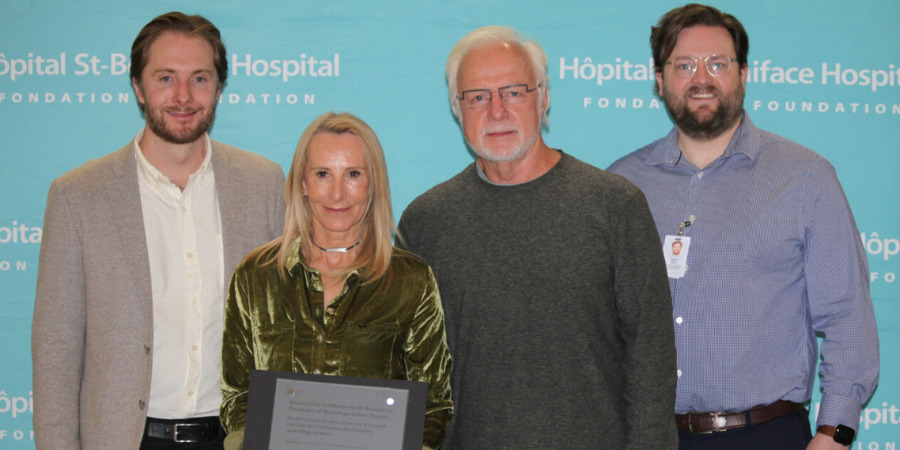Donation from Kali Dyck Foundation brings researcher to St. Boniface
Dr. Henry Dunn has devoted his career to understanding how neurons – the brain’s information messengers – communicate with one another and how this communication can become disrupted.
These neurodevelopmental deficits hold answers for families affected by Autism Spectrum Disorder (ASD) and neuropsychiatric disease.
Now he’s pursuing those answers at St. Boniface Hospital. Dunn joined St. Boniface Hospital Research last October as a Principal Investigator with the Division of Neurodegenerative Disorders (DND).
The Kali Dyck Foundation made a $500,000 donation in support of Dunn’s position and his lab.
“I’m so grateful the Dyck family sees the value in my research. They have my full commitment,” said Dunn. “The ultimate goal is to guide better early intervention and treatment options.”
According to a 2019 Statistics Canada health survey on children and youth, one in 50 Canadian children and youth aged one to 17 years were diagnosed with ASD. The disorder manifests in different ways depending on the person, with varying degrees of severity.
Parents Lloyd and Jackie Dyck know this firsthand. Their oldest son, Chad, now an adult, lives with ASD.
“When Chad was a baby, we experienced everything from (recommendations for) psychedelic drugs to putting him away in a home,” said Lloyd Dyck when the family met Dr. Dunn for the first time and toured his lab on January 30. “That was the amount of support we could find.”
A southern Ontario native, Dunn arrives in Winnipeg following six years as a Postdoctoral Researcher at The Scripps Research Institute in Jupiter, Florida: a world-renowned non-profit medical research facility. With his return to Canada, Dunn also became an Assistant Professor in the Department of Pharmacology and Therapeutics at the University of Manitoba.
Dunn made a discovery at Scripps Research that alters the current understanding of neuronal communication with implications for ASD and neuropsychiatric disease.
“Previously, we understood this neuronal communication mechanism heavily relied on G protein-coupled receptors (GPCRs). They’re known for receiving and interpreting chemical messages from communicating neurons,” he explained.
“I’ve discovered these GPCRs are facilitating additional neuronal communication pathways that were previously undescribed yet appear to be disrupted in patients with ASD and neuropsychiatric disease. This alternative mechanism might be useful to design novel, next-generation therapeutics specific to ASD and/or a host of neuropsychiatric diseases.”
The Dyck family, owners of Winnipeg-based agribusiness BrettYoung Seeds, see a parallel between their industry and Dunn’s research.
“We know research takes time,” said Lloyd Dyck. “We’re in this for the long haul, not the short term. We’re really looking forward to seeing what comes of the research.”
The family’s commitment to ASD research honours their daughter Kali, whose life was claimed at age 25 in 2011 by a car accident.
“Chad is our oldest and Kali was our third child,” said Jackie Dyck. “They did a lot together. She was a champion for Chad. She was a kind, caring soul who was looking at career in health care, maybe nursing.”
Thanks to you, scientists like Dr. Henry Dunn are pursuing treatments for challenging neurological disorders.

